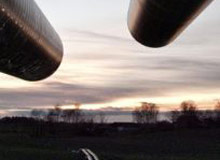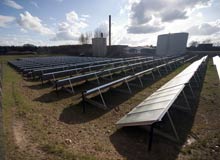Expansion of district heating in cities, investments in energy efficiency measures in buildings and installment of large heat pumps in less populated areas are three initiatives that can reduce energy costs more than continuing to use fossil fuels in Europe.
This is shown in the STRATEGO/Heat Roadmap Europe 3 calculations for the five countries Romania, Croatia, Italy, the United Kingdom and Czech Republic, chosen as representative countries for the differences within EU regarding population, climate, resources, and energy supply.
Associate Professor David Connolly thinks dristict heating is a solution to many of our energy challenges. Photo: Kristian Hegner Reinau.
Even after deducting the needed investment of 1.1 trillion euro for energy efficiency measures, the annual energy costs for the whole energy system including transport, electricity and heating will be reduced by an average of 15 percent.
At the same time, the countries will save energy, release less carbon dioxide and use more renewable energy, says Associate Professor David Connolly, coordinator of the Heat Roadmap Europe 3 project.
Excess heat can heat the EU
The research also shows that more excess heat goes to waste in the production of electricity than is needed to heat all the buildings in the EU countries.
- District heating can be the solution to utilize the wasted heat. We have produced maps that show where to locate district heating pipes to put the excess heat from power plants to use in cities that need the heat, says David Connolly.
Although large investments are needed in the countries that have little district heating, the biggest obstacle for putting the research results to use and expanding district heating is the lack of local government to make the decisions to invest in district heating.
- It is a paradox that while many countries have goals and strategies for the electricity and transport sectors, almost no countries have a strategy for heating. Heating is an excellent solution to many of our challenges and the technology exists today. We just need to implement it, says David Connolly.
TweetFUNDED BY
![]()







